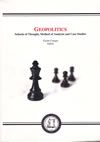Introducing Mahdi Ahouie
 Mahdi Ahouie (Tehran, 1977) is Post-doctoral Research Fellow at the Foundation for Interreligious and Intercultural Research and Dialogue in Geneva.
Mahdi Ahouie (Tehran, 1977) is Post-doctoral Research Fellow at the Foundation for Interreligious and Intercultural Research and Dialogue in Geneva.
He has obtained a PhD in International Relations at L’Institut de Hautes Études Internationales et du Développement (HEID, University of Geneva).
In the third part of a series of four interviews, Dr Ahouie discusses the policy options of the US towards Iran, including containment, an incentives based approach and a military attack. He further explains what difficulties the US would encounter during a land invasion of Iran, such as Iran’s geographic complexity, its defensive capacity and domestic resistance. The other parts of this interview are:
Interview
What policy options does the US have vis-à-vis Iran?
 The United States may choose to relate to Iran within the framework of five possible policies:
The United States may choose to relate to Iran within the framework of five possible policies:
- containing and isolating the Iranian regime, regionally and internationally – a policy which has, more or less, been followed by all the US administrations since the Iranian revolution of 1979
- adopting an incentives-based approach, with both sticks and carrots available, as embodied in the policies implemented by former President Bill Clinton and the current Obama administration
- creating a client state in Iran under U.S. mono-polar leadership, which was the model for U.S.-Iran relations under the Shah
- invading Iran by military force, similar to the 2003 U.S. invasion of Iraq, which was overtly considered for sometime by the Bush administration, albeit without any success
- cooperating with Iran on the basis of mutual interests, which was the prevailing model for U.S.-Iran relations during the 19th and early 20th centuries
Although the latter is definitely the best paradigm for Washington-Tehran relations, U.S. policy-makers have mostly abandoned it since the middle of the past century. Current US President Barack Obama’s call of “change” in all aspects of American domestic and foreign policies and his emphasis on the use of diplomacy towards Tehran created some hopes that the United States might eventually return to this best model of relationship vis-à-vis Iran.
However, as time passed, it has become clear that, at least for the time being, the Obama administration is unlikely to adopt a new policy with regard to Iran but a polished version of the previously-failed second model, based on a carrot and stick strategy.
To what extent would a military invasion of Iran over land by troops of US and its allies be difficult?
A large scale invasion of Iran would encounter numerous difficulties. The primary difficulty behind this scenario is the geographical complexity of the Iranian territory, consisting of high mountain chains and vast deserts. Major Iranian cities, unlike those in Iraq and Afghanistan, are also not concentrated in a direct line, but rather, they are spread throughout the country in a circular formation. These remarkable land characteristics greatly increase Iran’s defensive capacity against a land invasion.
A further difficulty in carrying out a land invasion is that Iran’s military capabilities are largely kept secret. US intelligence in this regard is essentially inadequate. This lack of information puts the United States in a vulnerable position in any military operation, because of its inability to predict the extent of the possible Iranian resistance.
There is also great diversity in the Iranian political system, which means that there is no individual symbol of an enemy, such as Saddam Hussein of Iraq, for the US or any other state to harp on. This political dynamic of Iran makes it very difficult, first to justify a possible war for the world public opinion, and second, to ensure that such an offensive would actually succeed in overthrowing the Iranian government.
Finally, a US invasion of Iran will arouse great domestic resistance, as all Iranians from various political perspectives share a nationalistic opposition to any foreign intervention. The ongoing Iranian oppostion movement inside the country, which has been influential among Iranian middle-class and urban population, would be strongly opposed to any change of the regime by foreign military invasion.
The regional and international reactions from the Muslim people of the world would also hinder any military attack. The extent of the damage to US interests in the Middle East, in the case of military action against Iran, is beyond calculation. Furthermore, most of Iran’s neghbours and US major regional allies, such as Turkey, Pakistan, Qatar, and even Saudi Arabia would most likely be opposed to any military invasion of Iran, as they are well aware of its disastrous consequences for the whole region.
